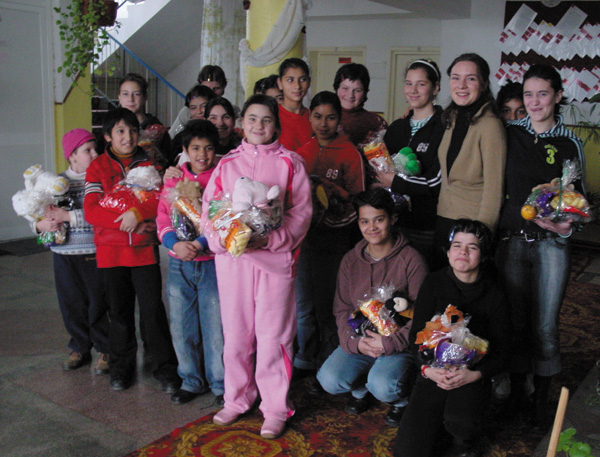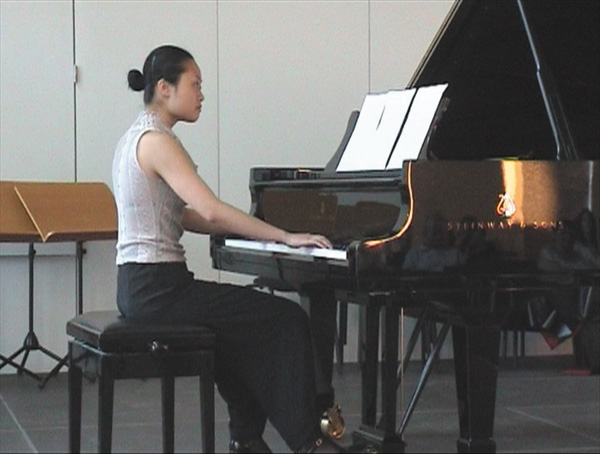(The following is an excerpt from the SYLFF Newsletter No.15, May 2006)
Anna Gutowska
This year’s SYLFF Chamber Music Seminar, the first of three such annual events planned and jointly developed by three SYLFF music schools—the Conservatoire national supérieur de musique et de danse de Paris, the University of Music and Performing Arts Vienna, and The Juilliard School, in New York City—took place at Juilliard from January 9th through 17th, 2006, in conjunction with Juilliard’s ChamberFest; a week of chamber music seminars, coaching, and performances.
As a step leading to participation in the seminar, five of us from our university in Vienna—Bojidara Kouzmanova (violin), Philipp Schachinger (cello), Heidrun (“Heidi”) Wirth (bassoon), David Szalkay (trumpet), and I—met at Vienna Airport on Sunday, January 8th, subsequently arriving in New York City after a long flight.
The seminar started on January 9th. It involved intensive hours of practice and coaching each day. We worked with different coaches on different pieces by a variety of composers, such as Stravinsky, Ives, and Friedmann. Juilliard has some 100 practice rooms, so enough rooms were available for us to practice individually and in groups until 11 p.m.— and some days we did so, meeting only for lunches and dinners. However, our time was not all work. Among the much appreciated ‘extracurricular’ events that Juilliard arranged for us during the seminar were a pizza party and a special Chinese dinner.
I was in a chamber group that also included Helena Madoka Berg and Christian Hacker from Germany, Benedicte Royer from Paris, and Ang Li from China. Helena, Christian, and Ang were students at Juilliard, and Benedicte was a student at the conservatoire in Paris. The piece that we chose to play was Anton Dvorak’s Piano Quintet in A-Major, op. 81, a very famous and wonderful piece that actually is for piano and strings and is also my favorite. We practiced in the morning and afternoon every day.
Our coach was Dr. Yoheved Kaplinsky, chair of the Piano Department of The Juilliard School, from which she had received a doctorate. She has been greatly praised for her musical accomplishments in recitals, chamber music programs, and orchestral performances. Before joining Juilliard, Dr. Kaplinsky taught at the Philadelphia University of the Arts, the Peabody Conservatory, and the Manhattan School of Music. Widely known for her exceptional knowledge of piano techniques, she is in great demand as a teacher of advanced pianists, and she has lectured extensively and judged major musical competitions across the world.
Dr. Kaplinsky provided us with fantastic coaching. She is a very quiet person, but when she is playing, her performance is like fireworks, full of emotion and also very, very warm. I thought that our Dvorak Quintet needed a lot of color and joy, and a little nostalgia, and as a result of her working with us on every element of this piece, we were able to play it in the expressive way that it deserves. I absolutely adore her, and I loved and enjoyed her lessons. Dr. Kaplinsky’s family came from Poland, and I hope that some day she will come to Poland to visit our school. We, the participants in the seminar, had different personalities, were from different countries and cultures, had studied at different schools, embraced different traditions (musical and otherwise), and had different ways of playing. But I think that this “mixture” was fantastic. It gave us many pleasant surprises, as well as much joy and many smiles, and we learned a lot from each other.
The concert in Paul Hall on the final day (January 17th) was held before a large audience, and perhaps it can best be described in these few words: personally satisfying and musically successful! I very much enjoyed performing with my quintet-friends, and, I’m glad to say, our performance was well-received. After the concert Dr. Kaplinsky came to us and said she was proud of us, which of course warmed our hearts and made us feel even more strongly that our hard work and intensive practice had been worthwhile. During the post-concert reception I met people from The Nippon Foundation, the Tokyo Foundation, and the Nippon Music Foundation. I was very happy to see Ms. Ellen Mashiko again after having met her for the first time in July 2005 during the SYLFF Africa/Europe Regional Forum in Coimbra, Portugal.
* * *
I am now back in Vienna.
My first visit to New York City, in addition to the very rewarding experience of collaborating with other students at Juilliard, was also enjoyable and memorable in other ways. I have many photos that I took while there: Central Park and its squirrels, Manhattan, Ground Zero, Planet Hollywood, the Metropolitan Opera, 34th Street, the Brooklyn Bridge, Chinatown, Times Square, and the Rockefeller Center and its ice rink, among others. Sometimes I look at my photos from my time in New York, and I laugh . . . about David Szalkay, who always had his video camera and was singing Jennifer Lopez songs, and about Bojidara, who was worried about her heavy baggage (she bought a lot of CDs and books in New York). And I remember the wonderful spaghetti party and playing the Uno card game . . . among many, many other memories.
Some of us from Vienna went to Avery Fisher Hall to listen to an open rehearsal of a violin concerto, “The Red Violin,” staged by Joshua Bell and the New York Philharmonic Orchestra, and we also saw a Metropolitan Opera production of the great ballet Swan Lake.
I also fondly remember a dinner at a sushi bar with my Vienna university roommate, Heidi, and Mathieu and Magie from Paris. The weather was very cold, but we were very happy to share time together. Heidi made entries in her diary every day, and we talked whenever we had a chance. We thoroughly enjoyed the 10 days we passed in New York with the fantastic people we met, played with, and heard play there.
I worked very hard. I attended all the seminar sessions, where I learned a lot. I did my best to contribute to the success of the SYLFF Chamber Music Seminar and our quintet’s performance. I hope I will meet all the seminar participants and teachers again someday . . . perhaps even in New York, which I enjoyed a lot.
After spending such an intense, enriching, and wonderful time in New York, a time that was so meaningful to me, I wish, on behalf of all other musicians who performed at the ChamberFest from the three music schools, to express our sincere gratitude to Ellen Mashiko and the Tokyo Foundation for providing us with such a wonderful opportunity and for the trust they placed in us.
I also wish to express my deepest and very respectful thanks to Professor Wolfgang Klos and Ms. Dorothea Riedel of the University of Music and Performing Arts Vienna, for the trust they placed in me and for making it possible for me to take part, first, in the SYLFF Africa/Europe Regional Forum in the summer of 2005, which in turn provided me with the opportunity to perform in the wonderful chamber music concert in the Biblioteca Joanina (King John Library) at the University of Coimbra during that forum, and then, second, in Juilliard’s ChamberFest this past January.
I will never forget New York. I am very, very happy to have had the experiences I did during ChamberFest, and especially to have been able to play and work with musicians and other people from different countries and cultures around the world. I believe that the SYLFF Chamber Music Seminars, by bringing together in this way such different people, with their varied languages and traditions, will help to eliminate misunderstanding and hatred from this unquiet and uneasy world, and bring goodwill and peace instead.
Anna Gutowska
A native of Poland, Ms. Anna Gutowska is a SYLFF fellow at the University of Music and Performing Arts Vienna, majoring in violin. She participated in the Asia/Pacific Regional Forum in Coimbra, Portugal, in 2005, and in the SYLFF Chamber Music Seminar that was held in January 2006 at The Juilliard School in New York City. This seminar is the first of three annual seminars, developed under the SYLFF Fellows Mobility Program (FMP), to be held at the three music schools involved.






